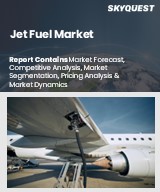
Report ID: SQMIG10C2049
Skyquest Technology's expert advisors have carried out comprehensive research and identified these companies as industry leaders in the Jet Fuel Market. This Analysis is based on comprehensive primary and secondary research on the corporate strategies, financial and operational performance, product portfolio, market share and brand analysis of all the leading Jet Fuel industry players.
The competitive landscape of the global jet fuel industry is currently undergoing a significant transformation, primarily driven by the urgent need for decarbonization and the emergence of sustainable aviation fuels (SAF). Traditional oil and gas giants, such as ExxonMobil, Chevron, BP, Shell, and TotalEnergies, are major players with established infrastructure for production, distribution, and supply of conventional jet fuel.
Several companies are focusing on developing technology to produce sustainable aviation fuel using renewable feedstocks like agricultural waste, carbon dioxide, and even municipal solid waste. This innovation aims to reduce the aviation industry's dependence on traditional fossil fuels, helping to meet global sustainability targets. New technological advancements are focused on capturing carbon emissions and converting them into usable jet fuel. This process not only helps mitigate climate change but also supports the aviation industry's transition to more sustainable fuel sources. Several projects are already in the works, producing fuels that can seamlessly replace conventional jet fuel.
Top Player’s Company Profile
REQUEST FOR SAMPLE
Want to customize this report? This report can be personalized according to your needs. Our analysts and industry experts will work directly with you to understand your requirements and provide you with customized data in a short amount of time. We offer $1000 worth of FREE customization at the time of purchase.
Feedback From Our Clients

Report ID: SQMIG10C2049
sales@skyquestt.com
USA +1 351-333-4748